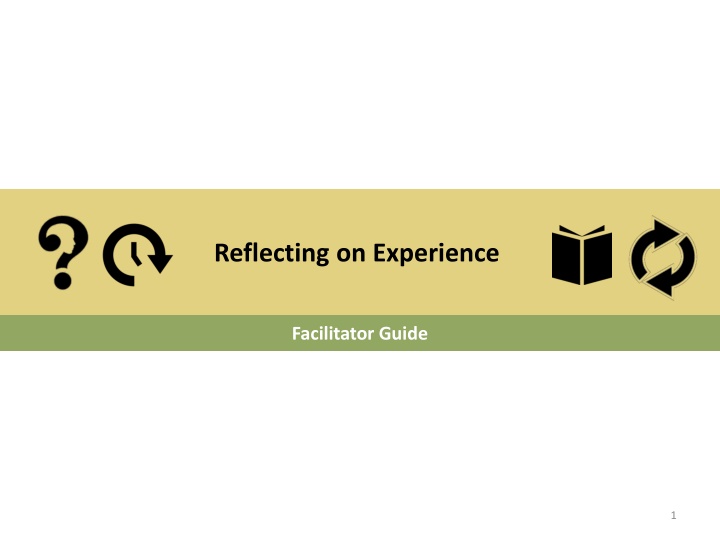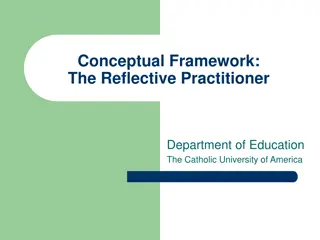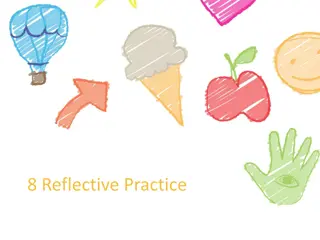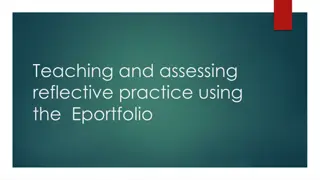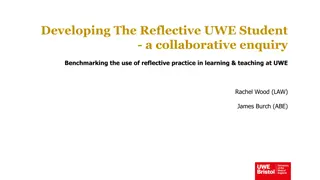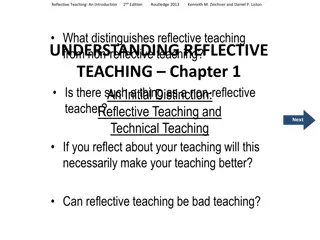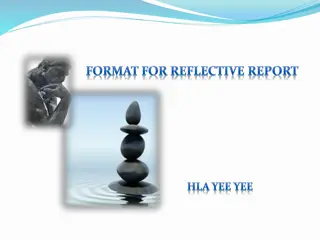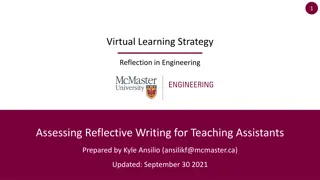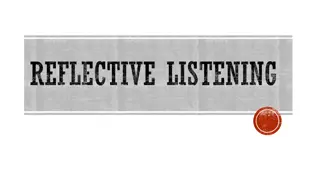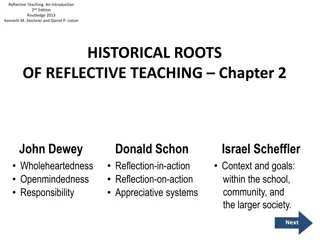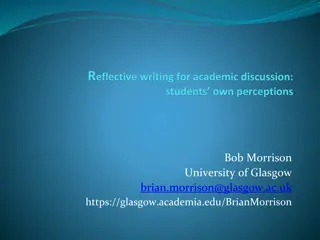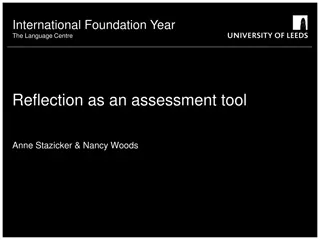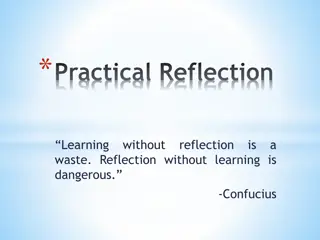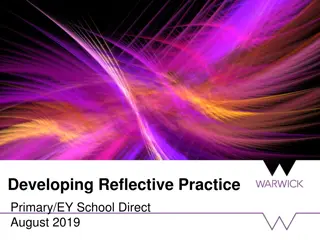Enhancing Learning Through Reflective Practice
This exercise guides participants through reflecting on a recent surprising experience, prompting deep introspection with a series of questions. By encouraging reflection on content, process, and premise, individuals learn to appreciate the importance of reflective practice for continuous learning and strategic thinking. Through group and individual activities, participants develop skills in asking insightful questions, recognizing connections, and utilizing iterative reflection for enhanced learning outcomes.
Download Presentation

Please find below an Image/Link to download the presentation.
The content on the website is provided AS IS for your information and personal use only. It may not be sold, licensed, or shared on other websites without obtaining consent from the author.If you encounter any issues during the download, it is possible that the publisher has removed the file from their server.
You are allowed to download the files provided on this website for personal or commercial use, subject to the condition that they are used lawfully. All files are the property of their respective owners.
The content on the website is provided AS IS for your information and personal use only. It may not be sold, licensed, or shared on other websites without obtaining consent from the author.
E N D
Presentation Transcript
Reflecting on Experience Facilitator Guide 1
Reflecting on Experience Facilitator Guide Purpose of Exercise This exercise provides practice in using reflection to enhance learning, and in asking oneself a range of questions to promote deep reflection. Estimated Run Time This exercise will take approximately 2 to 2-1/4 hours. To reduce the length of the exercise, certain portions of the exercise can be conducted as homework or on one s own time. Summary of Exercise Participants reflect on a recent experience that involved an element of surprise, or did not turn out the way they expected. Participants are prompted to ask themselves questions that focus on aspects of reflective practice, including reflection on content, process, and premise (i.e., what, how, and why). Then, participants work with others to describe what they considered, to pose additional questions, and to reflect collectively. 2
Reflecting on Experience Facilitator Guide Learning Objectives By the end of this exercise, participants should be able to: Appreciate the importance of reflection for continuous learning and strategic thinking. Recognize the value of different types of questions for yielding unique types of information. Demonstrate greater ease in reflecting on an experience. Appreciate reflection as an opportunity to identify connections and inter-relationships that may not otherwise be apparent. Recognize when and how to use iterative reflection in daily operations to support continuous learning and improved strategic thinking. Relation to Other Exercises This exercise works well as the first exercise, prior to Asking Powerful Questions, Telling a Story, and Potential Futures. It is less complex than the other three activities, and provides a good starting point. It also allows participants to practice and discuss reflective thinking, an activity that is embedded in all of the exercises. Group or Individual Activity 3 This exercise includes activities that require a combination of group and individual work.
Reflecting on Experience Facilitator Guide Materials Needed (Facilitator) This exercise does not require a facilitator, and can be conducted individually. However it can also be conducted with a facilitator and in a group setting. Whiteboard and markers. One downloadable Participant Guide for each participant. Expert perspective videos (viewable in the Managing Complex Problems Resource: Expert Perspective Videos page, filter by Reflecting on Experience). Materials Needed (Participants) Participant Guide Pen/pencil Notebook or paper 4
Reflecting on Experience Facilitator Guide Facilitator Tips and Guidance Remind participants to withhold judgment. Reassure participants that confusion can be a normal part of the reflective process. Remind participants to reflect on why events occurred as they did, in addition to what and how things happened. Encourage participants to use different types of reflective questions to achieve progressively deeper levels of learning. Encourage participants to engage in reflective thinking on their own or with a mentor or group of peers. Intersperse the pre-, mid-, and post-exercise reflection discussions with videos on the topic of reflection (viewable in the Managing Complex Problems Resource) If participants are unable to recall an operational situation: It is acceptable for them to work with a surprising situation from their personal history instead. Although reflecting on an operational situation will provide added value, the most important part of the exercise is that participants gain practice in reflecting (on any experience) and using different types of questions to drive learning. 5
Reflecting on Experience Facilitator Script Instructions The next several pages provide step-by-step instructions for facilitating the exercise, broken down into modules. Each module includes icons to indicate its duration, DO: facilitator actions, SAY: facilitator talking points, and DISCUSS: questions for group discussion (see below for icons). While the talking points are simply intended to guide the facilitator, we recommend including them to achieve the intended learning outcomes. Talking points that are listed directly under an action are meant to assist the facilitator with that given action. Also, optional break points are indicated at the end of certain modules. Some modules also include clickable links to the exercise slide deck that supplement the facilitator guide. We recommend referring to the accompanying slide content while guiding your group through this exercise. Module SAY DISCUSS DO Duration 6
Step Facilitator Activity 1 DO - Exercise Set up Distribute and describe Participant Guide. SAY - - 35-45 min Today we are going to practice our reflective thinking skills. This guide contains information that you will use throughout the exercise. I ll let you know when you need to turn to a particular section. Also, you can take this with you after the exercise. DO - Conduct pre-exercise reflection. Direct participants to the Participant Guide and describe the task. SAY - Before we get started, please flip to the Pre-Exercise Reflection section of your Participant Guide. Take a few minutes to think about the questions listed there before we discuss them as a group. DO - View Value of Reflecting on Experience Exercise and other expert perspective videos on reflection. Access through the Managing Complex Problems Resource: Expert Perspective Videos page, filter by Reflecting on Experience. 7
Step Facilitator Activity 1 Exercise Set up (contd.) DISCUSS - Guide the group through a discussion using the following questions: - When are you most likely to engage in reflective thinking? Why? - How do you engage in reflective thinking? - Think about times when you engage in reflection. What helps you move into a reflective mode? - Is there a particular person (or more than one person) who helps you think reflectively, someone you tend to use as a sounding board? - What is it about that particular individual? - How do you expect reflective thinking to help you? What will you gain from reflective thinking? 35-45 min DO - Provide brief tutorial. See supporting slides. - [Note: Facilitator may decide to present tutorial verbally, print the slides, project PowerPoint, or some combination thereof.] 8
Step Facilitator Activity 1 Exercise Set up (contd.) DO - Describe the exercise. SAY - 35-45 min To practice the skill of reflective thinking today, I m going to ask you to identify a recent event or situation that went differently than you expected. Then you will consider a set of questions to help prompt your thinking about that situation. The questions will help you to think in greater depth about what happened, how it happened, and why it happened. [End of Step 1] 9
Step Facilitator Activity 2 Identify & Reflect on Situation DO Ask each participant to recall a recent operational situation or event that went differently than expected. [Note: This can be an individual situation or event or one shared by everyone in the group.] [Note: If participants are unable to recall an operational situation that went differently than expected, it is acceptable for them to work with a surprising situation from their personal history instead.] 30 min SAY - I d like you to start by thinking about a recent operational situation or event that did not go as you expected it to. It should be an event you were personally involved in, rather than one you heard about secondhand. It can be a situation where the outcomes were worse than expected or one where things turned out better than expected. The situation should be vivid enough in your memory that you can recall specific details. - - - 10
Step Facilitator Activity 2 Identify & Reflect on Situation (contd.) SAY Later in the exercise, you will be describing your event to others. So make sure you select an event that you will feel comfortable sharing. 30 min DO Refer participants to Starter Questions in the Participant Guide. SAY In this section, you will see a set of questions that can help prompt your thinking. DO Ask participants to work independently to reflect on the event. SAY Working on your own, spend 20-25 minutes thinking about what contributed to the situation unfolding in the way it did. 11
Step Facilitator Activity 2 Identify & Reflect on Situation (contd.) SAY Use the starter questions provided in the Participant Guide to prompt your thinking, but don t feel limited to these questions. If other ideas occur to you, feel free to explore them. Be sure to spend time on each type of reflection: - The first set of questions will help you reflect on content the description of what happened. - The second set of questions will help you reflect on process the explanation of how the event unfolded. - The third set of questions will help you think about premise the consideration of why the event happened and the assumptions you held about the situation. - As you reflect on the event and answer the questions, please jot down some notes so you can share what you thought about with others later in this exercise. 30 min [End of Step 2] - BREAK - 12
Step Facilitator Activity 3 Participants Share Reflections DO Have individuals pair up with one or two other people. SAY - This next discussion will focus on what each of you learned so far as you reflected on the situation that went differently than you expected. 25-30 min DO Ask each participant to describe the situation or event they experienced to the others in their group. Each person should take 3 minutes or less. DO Ask each participant to describe their responses to the reflection questions. 13
Step Facilitator Activity 3 Participants Share Reflections (contd.) SAY - Next, I d like each of you to describe how you answered the reflection questions about the situation or event you ve been thinking about. Take the questions one at a time so that each person has a chance to share his/her responses to that question (Plan on spending 10-15 minutes on this portion). As others present, I encourage you to ask additional questions or provide comments that build on the presenter s interpretation and reflection. Maybe you see a relationship that the presenter hasn t mentioned; or maybe you have a clarifying question. Your questions should focus on helping the presenter reflect more deeply on the event and consider additional connections that they may not have considered. 25-30 min - [End of Step 3] 14
Step Facilitator Activity 4 Exercise Debrief SAY - We are now going to spend some time thinking about what we learned in this exercise. 25-30 min DO - Refer participants to Exercise Debrief in the Participant Guide. Ask them to consider each of the debrief questions and write notes in response to them. SAY - First, take about 5-10 minutes to work individually to think through each of these questions. Jot down some notes. After you ve had a chance to work on your own with the questions, we are going to discuss them as a group. DISCUSS - Guide the group through a discussion using the following questions: - How has your understanding of the situation changed? - Are there particular aspects of the situation that you now understand more clearly? 15
Step Facilitator Activity 4 Exercise Debrief (contd.) DISCUSS [Questions contd.] - What have you learned or become aware of that hadn t occurred to you before? - Are there particular points of view that you hadn t previously considered or appreciated in the same way you do now? - Are there alternative actions you hadn t previously considered that you now realize you could have? - Are there certain connections and inter-relationships at play in this situation that you hadn t previously recognized that you do now? - What else have you gained from reflecting on the situation? - Think about the different types of questions (content, process, and premise questions) you considered. How might different types of questions contribute to deeper insights? - Do you see any drawbacks to reflection? Do you have ideas for how you might address those obstacles? - In what ways do you anticipate using reflective thinking in your daily operations? What might get in the way of reflection? Do you have ideas for how you might address those obstacles? 25-30 min 16
Step Facilitator Activity 4 Exercise Debrief (contd.) DISCUSS [Questions contd.] - Do you think you engage in enough reflective thinking? If not, how might you engage in reflective thinking more often? - How might you balance quantity vs. quality of reflection? 25-30 min [End of Reflecting on the Environment Exercise] 17
